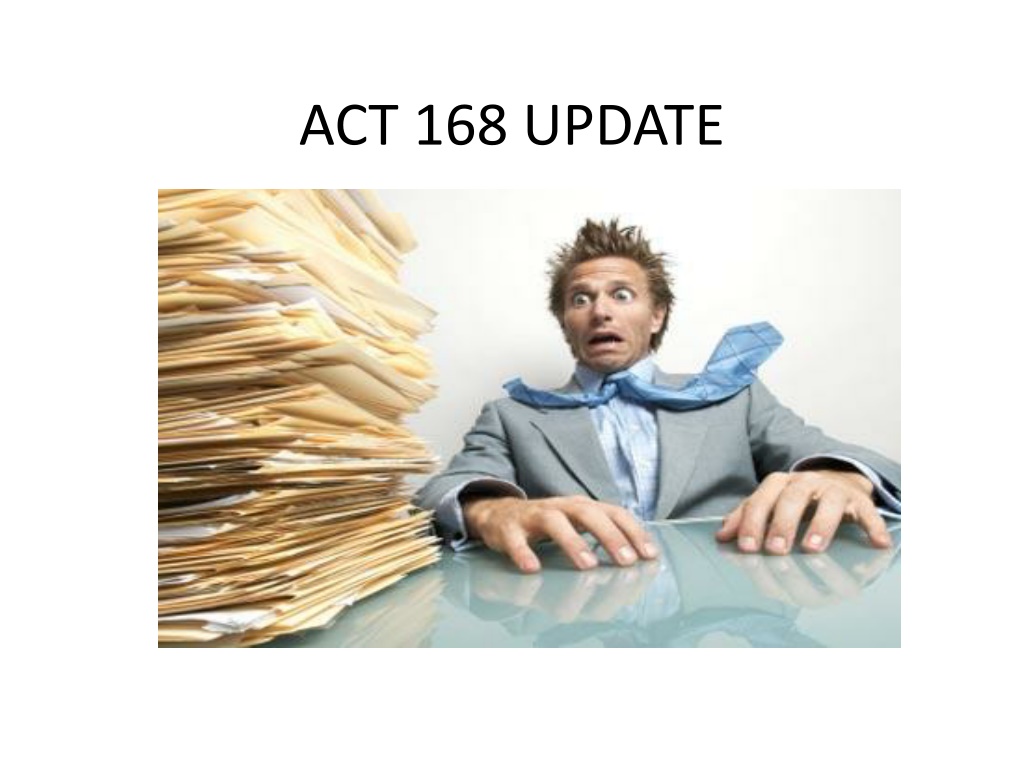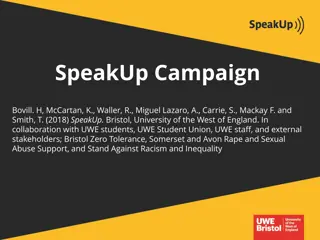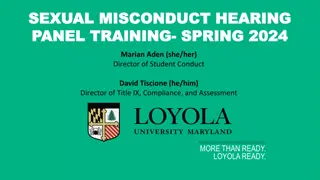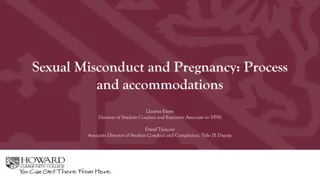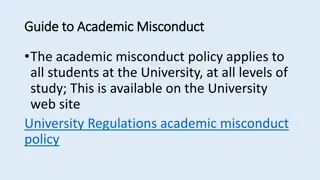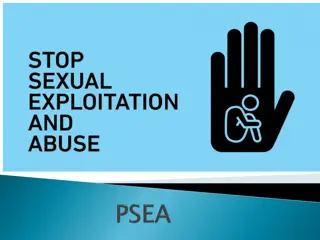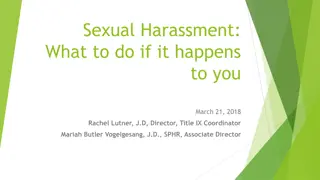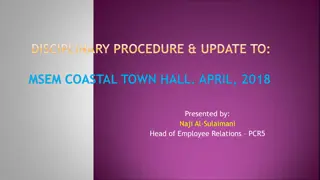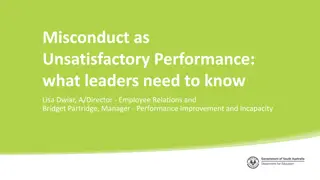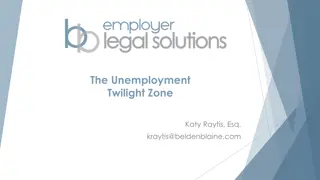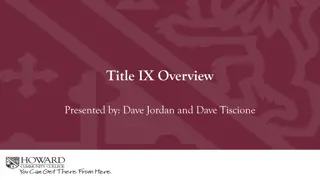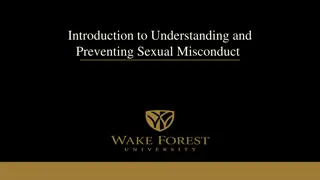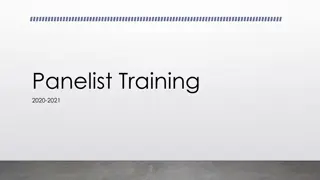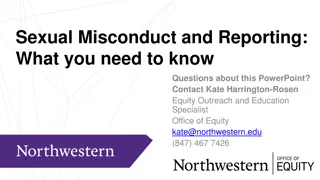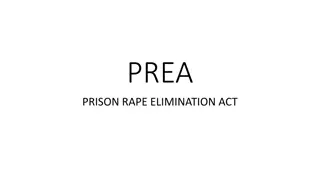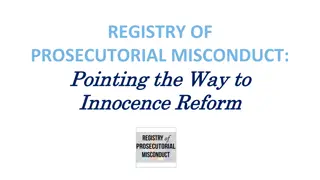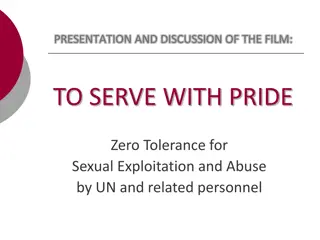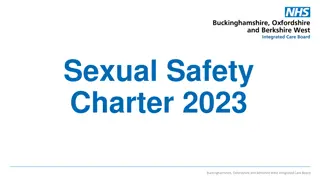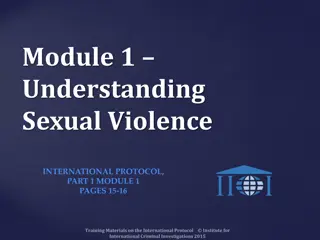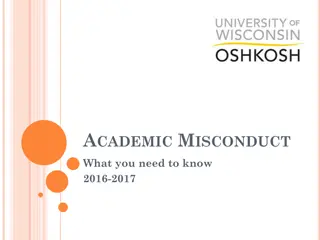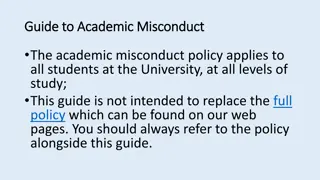Understanding Sexual Misconduct in School Settings
This presentation outlines definitions related to school entities, direct contact with children, sexual misconduct, red flags, and continued abuse in educational environments. It emphasizes the importance of recognizing and preventing inappropriate behaviors towards children and students, providing guidance for school personnel to ensure a safe and respectful learning environment.
Download Presentation

Please find below an Image/Link to download the presentation.
The content on the website is provided AS IS for your information and personal use only. It may not be sold, licensed, or shared on other websites without obtaining consent from the author. Download presentation by click this link. If you encounter any issues during the download, it is possible that the publisher has removed the file from their server.
E N D
Presentation Transcript
This presentation is intended for informational purposes only and is not intended to provide legal advice. Agency personnel should consult with their counsel concerning all applicable laws and regulations including, without limitation, the matters discussed in this presentation.
Definitions School entity: Any public school, including a charter school or cyber charter school, private school, nonpublic school, IU or AVTS Direct contact with Children: The possibility of care, supervision, guidance or control of children or routine interaction with children
Definitions Sexual misconduct shall mean any act, including but not limited to any verbal, non-verbal, written or electronic communication or physical activity, directed towards or with a child or a student regardless of the age of the child or student that is designed to establish a romantic or sexual relationship with the child or student. Such prohibited acts include but are not limited to: (1) sexual or romantic invitations; (2) dating or soliciting dates; (3) engaging in sexualized or romantic dialogue; (4) making sexually suggestive comments; (5) self-disclosure or physical exposure of a sexual, romantic or erotic nature; or (6) any sexual, indecent, romantic or erotic contact with the child or student. A child or student may NOT consent to sexual misconduct regardless of the age of the child or student
SEXUAL MISCONDUCT-RED FLAGS Adult Behavior- -Singling student out for special attention -Compliments on appearance -Giving/Soliciting Gifts -Non-sexual touching -Time alone with student/private spaces -Sharing personal information with student -Flirtatious behavior -Personal electronic communications
SEXUAL MISCONDUCT-RED FLAGS Changes in student behavior- -Inappropriate sexual behavior -Late arrivals to class -Changes in Personality -Increased time with one adult Rumors about student and a teacher
Definitions Continued Abuse: Conduct that falls under the purview and reporting requirements of the Child Protective Services Law (CPSL) and is directed toward a child or a student, regardless of the age of the child or student
Who Needs an Employment History Review? All positions for employment at school entities and independent contractors of school entities involving direct contact with children after December 22, 2014 Employer determines whether position involves the possibility of care, supervision, guidance or control of children or routine interaction with children Consider whether contact is regular, on-going and integral to day to day responsibilities Student safety is paramount
Who Doesnt Need an Employment History Review? Applicants for positions that do not involve direct contact with children Employees hired before December 22, 2014 who remain employed by the same entity in the same position EXCEPT existing employees of independent contractors (including entities providing substitute staffing services) who have not undergone an employment history review must participate in the review prior to assignment at a new school entity Employees who have undergone the employment history review and who are transferring to a school within the same district, diocese or other organization Volunteers Student Teachers
Substitutes Review required prior to initial hiring or placement on approved list Remains valid as long as substitute remains employed or on the approved list A separate review is required for each school entity utilizing the substitute unless the substitute is employed by a substitute staffing service
What Applicants Must Do List ALL current employers (includes non-school entities/positions with no direct contact) List ALL former employers that were school entities List ALL former employers where applicant had direct contact with children -No time limit on how far back applicant must go -Includes out-of-state employers -Positions held as volunteer not included Provide statement regarding Abuse and Sexual Misconduct -Statement required even if no current or former employers -Applicants not required to disclose false allegations Provide written authorization and release from liability for disclosure of information and documents by current and former employers
What Employers Must Do Confirm applicant s statements with current and former employers Check certification and discipline status of applicant Inquire with PDE regarding pending criminal charges (for applicants who hold a certificate and/or who have a PPID only) Follow-up after affirmative responses if still considering applicant for employment Inform school entity of any affirmative responses prior to assignment and provide records related to employees upon request by school entity (for independent contractors) Disclose information requested by other prospective employing school entities and contractors Comply with mandatory reporting obligations in CPSL and Educator Discipline Act (even if not considering applicant for employment) Maintain records
What Employers May Do Conduct further investigations or require additional information or authorizations from applicants Disclose more information than required by Act 168 Use information obtained to evaluate fitness to be hired or for continued employment Report information to PDE, a state licensing agency, law enforcement agency, child protective services agency or another school entity or prospective employer
What Employers May Not Do Hire an applicant who does not provide the required information Enter into any contract or agreement that suppresses information, affects reporting or requires the employer to expunge information related to allegations or findings of sexual misconduct or abuse Willfully fail to respond or refuse to provide information or records to other prospective employers Assign an employee for work over the objection of a school entity (for independent contractors) Contract with an independent contractor who is found to have willfully violated Act 168
When Employment history review must be completed prior to initial hire or assignment unless all the requirements for provisional hiring are met Current and former employers must respond within 20 calendar days of receiving the initial request for information and within 60 calendar days of a request for additional information
How Applicants and Employers must use the forms created by PDE A separate form is required for each employer Electronic transmission (fax, email, etc.) is acceptable (phone verification in lieu of the required forms is not permitted)
Provisional Hiring Provisional employment of applicants can be made for up to 90 days of employment, if: Applicant completes all required forms and swears that he or she is not disqualified from employment Administrator has no knowledge of information that would disqualify the applicant from employment Applicant is not permitted to work alone with children and is required to work in the immediate vicinity of a permanent employee
MANDATORY REPORTING FOR CHIEF SCHOOL ADMINISTRATORS (1) Any educator who has been provided with notice of intent to dismiss or remove for cause, notice of nonrenewal for cause, notice of removal from eligibility lists for cause or notice of a determination not to reemploy for cause. (2) Any educator who has been arrested, indicted or convicted for a misdemeanor or felony. (3) Any educator against whom allegations have been made that the educator has: (i) committed sexual abuse or exploitation involving a child or student; or (ii) engaged in sexual misconduct with a child or student. (3.1) Information which constitutes reasonable cause to suspect that an educator has caused physical injury to a child or student as a result of negligence or malice. (4) Any educator who has resigned, retired or otherwise separated from employment after a school entity has received information of alleged misconduct under this act. (5) Any educator who is the subject of a report filed by the school entity under the reporting requirements of 23 Pa.C.S. Ch. 63 (relating to child protective services). (6) Any educator who the school entity knows to have been named as the perpetrator of an indicated or founded report of child abuse or named as an individual responsible for injury or abuse in an indicated or founded report for a school employe under 23 Pa.C.S. Ch. 63.
Immunity Act 168: employers, school entities, school administrators and independent contractors are immune from criminal liability under the CPSL and the Educator Discipline Act and from civil liability unless information or records disclosed were knowingly false Educator Discipline Act: school entities are immune from civil liability for filing a complaint or a report and for providing information regarding the professional conduct of a former or current employee to a prospective employer unless information provided is knowingly false
Violations Applicants who provide false information or willfully fail to disclose information are subject to employment action, professional discipline and/or criminal and civil penalties Employers, school entities, administrators and contractors who willfully fail to respond or to provide information are subject to civil penalties and/or professional discipline
